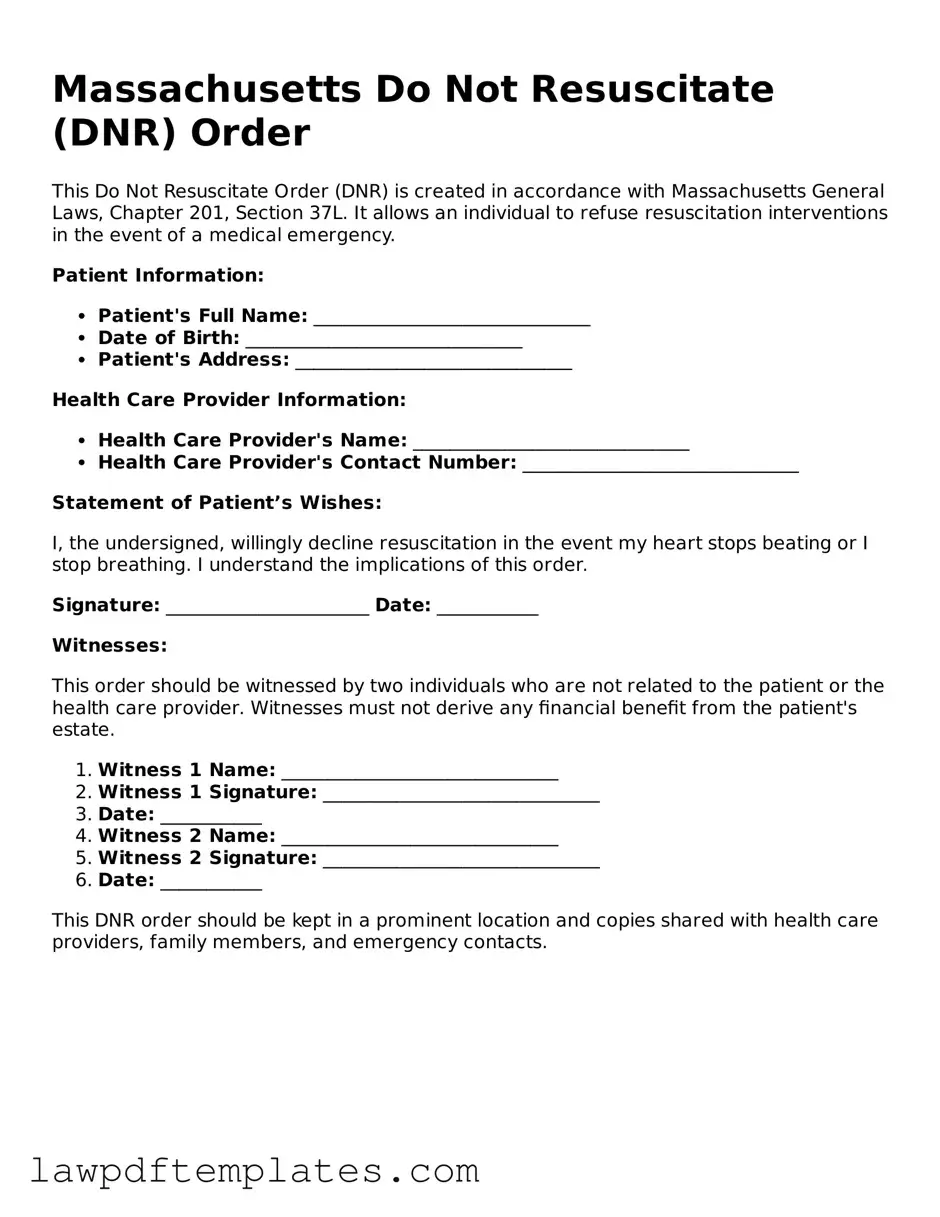Free Do Not Resuscitate Order Template for the State of Massachusetts
Form Breakdown
| Fact Name | Description |
|---|---|
| Governing Law | The Massachusetts Do Not Resuscitate Order form is governed by Massachusetts General Laws Chapter 201D. |
| Purpose | This form is used to indicate a person's wish not to receive cardiopulmonary resuscitation (CPR) in the event of cardiac arrest. |
| Eligibility | Any adult can complete a DNR order, provided they are capable of making informed medical decisions. |
| Signature Requirement | The form must be signed by the patient or their legal representative and a physician. |
| Validity | A properly completed DNR order remains valid until revoked or until the patient’s death. |
| Emergency Medical Services | Emergency medical personnel must honor a valid DNR order in the field. |
| Patient Rights | Patients have the right to change or revoke their DNR order at any time. |
| Form Availability | The DNR order form is available through healthcare providers, hospitals, and online resources. |
| Healthcare Provider Notification | Patients should ensure their healthcare providers are aware of the DNR order to ensure it is respected. |
| Additional Considerations | Patients may also consider discussing their wishes with family members to avoid confusion during emergencies. |
Sample - Massachusetts Do Not Resuscitate Order Form
Massachusetts Do Not Resuscitate (DNR) Order
This Do Not Resuscitate Order (DNR) is created in accordance with Massachusetts General Laws, Chapter 201, Section 37L. It allows an individual to refuse resuscitation interventions in the event of a medical emergency.
Patient Information:
- Patient's Full Name: ______________________________
- Date of Birth: ______________________________
- Patient's Address: ______________________________
Health Care Provider Information:
- Health Care Provider's Name: ______________________________
- Health Care Provider's Contact Number: ______________________________
Statement of Patient’s Wishes:
I, the undersigned, willingly decline resuscitation in the event my heart stops beating or I stop breathing. I understand the implications of this order.
Signature: ______________________ Date: ___________
Witnesses:
This order should be witnessed by two individuals who are not related to the patient or the health care provider. Witnesses must not derive any financial benefit from the patient's estate.
- Witness 1 Name: ______________________________
- Witness 1 Signature: ______________________________
- Date: ___________
- Witness 2 Name: ______________________________
- Witness 2 Signature: ______________________________
- Date: ___________
This DNR order should be kept in a prominent location and copies shared with health care providers, family members, and emergency contacts.
Common mistakes
Filling out a Do Not Resuscitate (DNR) Order form in Massachusetts is a significant decision that requires careful consideration. Many individuals make mistakes during this process, which can lead to confusion and unintended consequences. Understanding these common pitfalls can help ensure that your wishes are clearly communicated and respected.
One frequent mistake is not discussing the DNR order with family members or healthcare providers beforehand. Conversations about end-of-life preferences can be uncomfortable, but they are essential. Without these discussions, loved ones may be unaware of your wishes, leading to potential conflicts during critical moments. It's important to have open dialogues about your decisions and ensure everyone is on the same page.
Another common error is failing to complete the form correctly. The DNR order must be filled out with accurate information, including the patient’s name, date of birth, and the signature of the physician. Incomplete forms may not be honored by medical personnel, which defeats the purpose of having the order in place. Always double-check the details to ensure everything is filled out as required.
Some individuals mistakenly believe that a DNR order is a permanent document that cannot be changed. This is not the case. A DNR can be revoked or modified at any time, as long as the patient is capable of making decisions. Keeping your DNR order up to date with your current wishes is crucial. Regularly review the document, especially after significant life changes.
Another mistake occurs when people do not provide copies of the DNR order to relevant parties. Simply filling out the form is not enough; it must be shared with healthcare providers, family members, and anyone else involved in your care. Without copies readily available, there is a risk that your wishes may not be honored in an emergency situation.
Lastly, some individuals overlook the importance of understanding the implications of a DNR order. It’s essential to grasp what a DNR means for your medical care and treatment options. A DNR does not mean that you will receive no medical care; rather, it specifies that you do not want resuscitation efforts in the event of cardiac arrest. Being fully informed helps ensure that your healthcare decisions align with your values and preferences.
Discover More Do Not Resuscitate Order Templates for Specific States
Polst Form Illinois - A Do Not Resuscitate Order (DNR) indicates a person's wish to not receive CPR in the event of cardiac arrest.
For those looking to understand the specifics of the vehicle sale process, accessing resources like the PDF Documents Hub can provide valuable guidance and templates to effectively utilize the Texas Vehicle Purchase Agreement form.
Dnr Cca Meaning - Creating a DNR can help clarify a patient’s treatment preferences for their loved ones.
